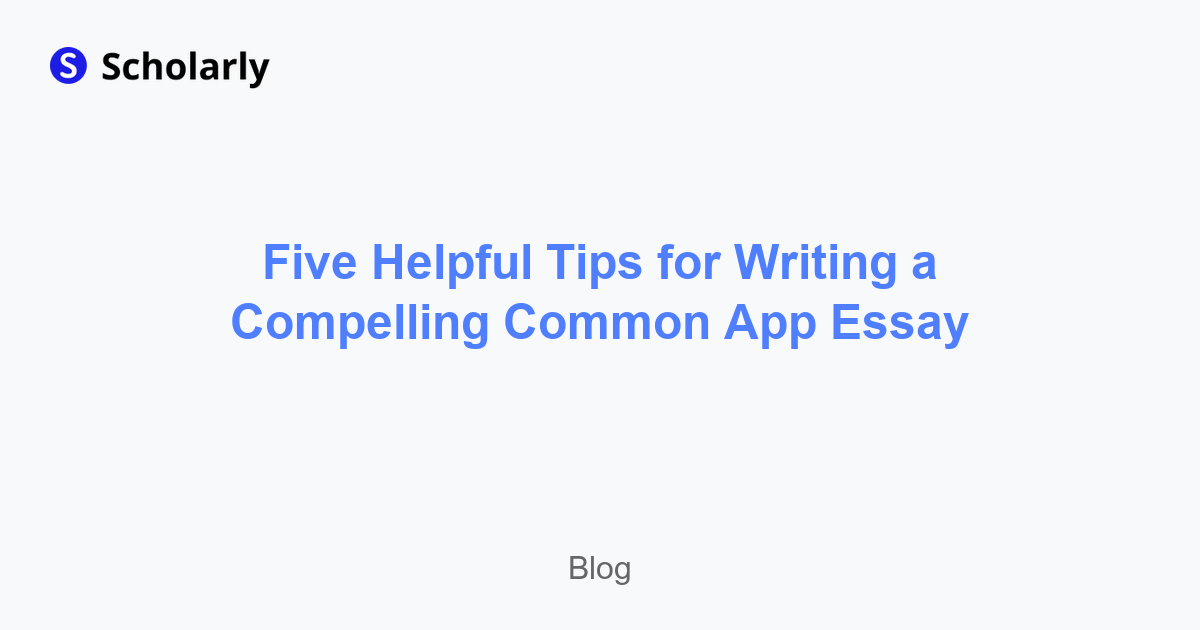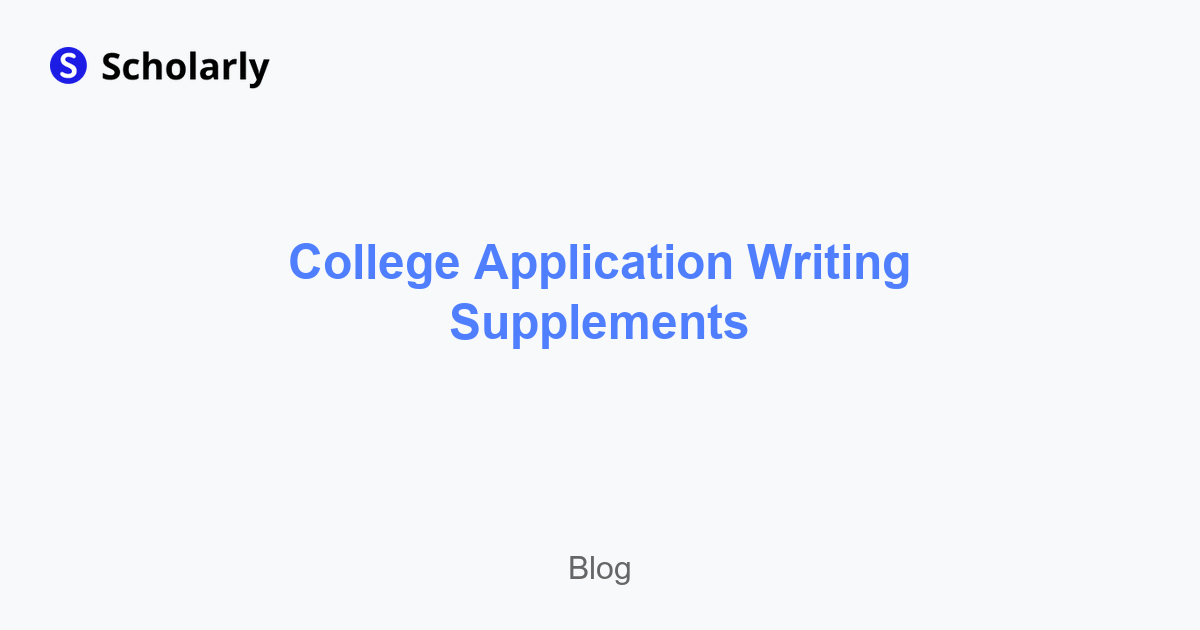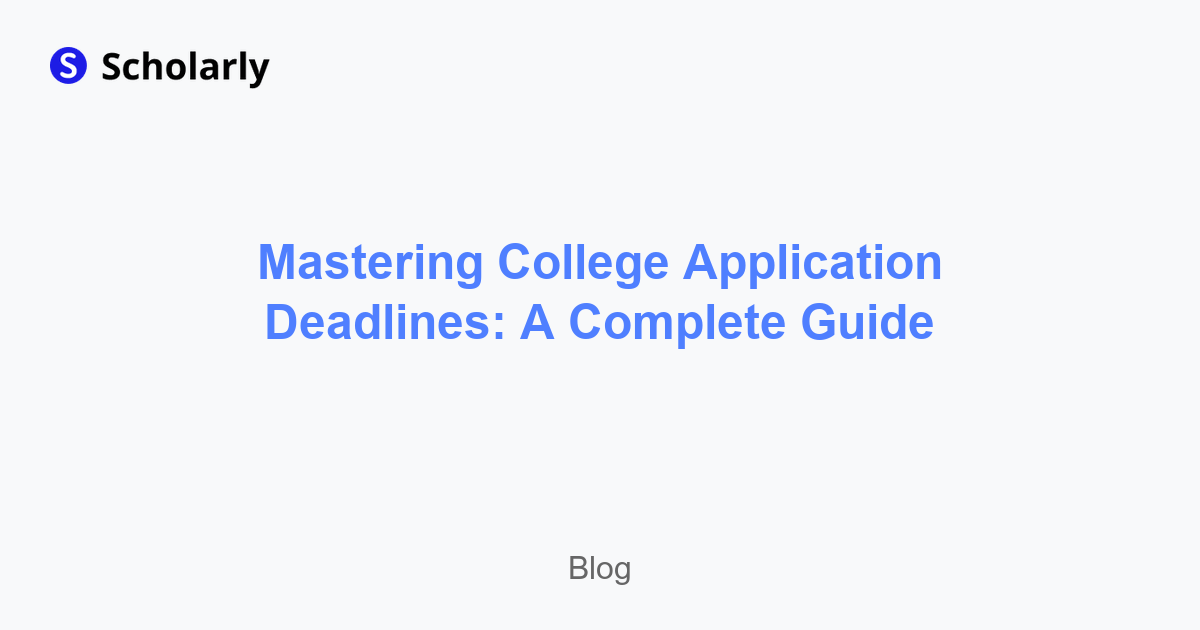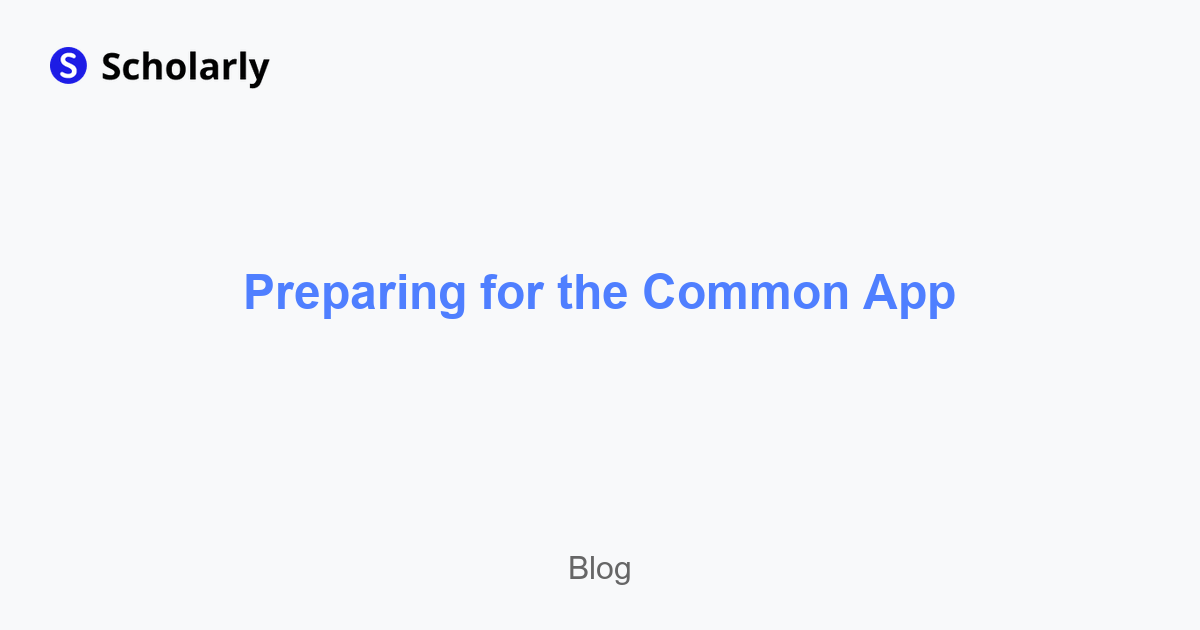Five Helpful Tips for Writing a Compelling Common App Essay
Your Common App essay can make or break your application. Here's how to write one that actually stands out to admissions officers.

Staring at the Common App essay prompts can feel paralyzing. You know this 650-word essay matters. Admissions officers will read it. It could be the difference between acceptance and rejection.
But where do you even start?
The truth is, thousands of students write forgettable Common App essays every year. They're grammatically correct, properly formatted, and completely unmemorable. Then there are the essays that make admissions officers pause, lean in, and actually want to meet the person behind the application.
The difference isn't talent or perfect grades. It's knowing what makes an essay compelling.
Understanding What the Common App Essay Actually Does
Before diving into specific tips, you need to understand the purpose of this essay.
Your transcript shows your grades. Your activities list shows what you do. Your test scores show how you perform on standardized tests. But none of these components show who you are as a person.
The Common App essay is your chance to be more than numbers and lists.
Admissions officers read thousands of essays each application season. They're not looking for the student with the most impressive achievements or the most tragic backstory. They're looking for authentic people they'd actually want on their campus.
Your essay should reveal:
- How you think about the world
- What matters to you
- How you've grown or changed
- What makes you unique
- Why you'd contribute something valuable to their campus community
With that context, here are five tips that will actually help you write a compelling essay.
Tip 1: Choose Your Story Before You Choose Your Prompt
This is the most important tip, and it's where most students get stuck.
They look at the seven Common App prompts and try to think of something to write about that fits. This is backwards.
The prompts don't matter. Your story matters.
The Common App prompts are intentionally broad. Prompt 7 literally says "Share an essay on any topic of your choice." That's there for a reason: the prompts are just frameworks. They're not actually the point.
How to Find Your Story
Instead of starting with the prompts, ask yourself:
What's a moment, experience, or realization that genuinely changed how you think about something?
It doesn't need to be dramatic. It can be small. The best essays often come from seemingly mundane moments that sparked genuine insight.
Some examples:
- Realizing your perspective on failure changed after bombing a presentation
- Understanding something new about yourself through a hobby or interest
- A conversation that shifted how you see the world
- A challenge that taught you something unexpected about your values
What's something people don't know about you from looking at the rest of your application?
Maybe your activities list shows you're a competitive athlete, but what it doesn't show is why you started playing in the first place, or what you learned from it that has nothing to do with winning.
Maybe your transcript shows straight A's, but it doesn't show the time you struggled with a concept and how that struggle taught you something about persistence or asking for help.
What topic could you write about for 650 words without getting bored?
If the idea of writing about something makes you yawn, admissions officers will yawn too. Pick something you actually care about.
Once you have your story, then you can figure out which prompt it loosely fits. Most stories can work with multiple prompts. The prompt is just a technicality.
Tip 2: Be Specific, Not Generic
Generic essays are the ones admissions officers forget five minutes after reading them.
Here's a generic sentence: "Volunteering at the animal shelter taught me the importance of compassion and helping others."
Here's a specific one: "When Max, the three-legged terrier who'd been at the shelter for eight months, finally got adopted, I realized I'd been showing up every week not because I wanted to 'make a difference' in some abstract way, but because I genuinely cared about whether these specific dogs found homes."
See the difference?
Why Specificity Matters
Specific details:
- Make your essay memorable
- Prove you're writing about a real experience, not making something up
- Show instead of tell
- Create emotional connection
- Demonstrate genuine reflection
Generic statements could apply to anyone. Specific details can only apply to you.
How to Be More Specific
Use concrete details: Instead of "my hometown," say "the small Oregon logging town where I grew up." Instead of "my favorite teacher," say "Mr. Harrison, my tenth-grade chemistry teacher who wore the same Star Wars tie every Friday."
Include dialogue: Real conversations make scenes come alive. What did someone actually say? How did you respond?
Name specific moments: Don't say "I often helped my younger siblings." Say "Every Tuesday and Thursday after school, I'd help my eight-year-old brother with his multiplication tables while making dinner."
Describe what you saw, heard, felt: Sensory details make experiences real. What did something smell like? Look like? Sound like?
The more specific you are, the more your essay will stand out.
Tip 3: Show Deep Reflection, Not Just Events
Many students write essays that are basically narratives. "This happened, then that happened, then this happened."
That's not enough.
Admissions officers don't just want to know what happened. They want to know what you think about what happened.
The Difference Between Narration and Reflection
Narration: "I joined the debate team freshman year. We practiced every week and competed at tournaments. I learned public speaking skills and made friends."
Reflection: "I joined the debate team thinking I'd learn to win arguments. Instead, I learned the opposite: how to listen. The best debaters aren't the ones who talk the most convincingly. They're the ones who understand their opponent's argument well enough to dismantle it. That realization changed how I approach disagreements in every part of my life."
See the difference? The second example tells you something about how this student thinks.
Questions to Deepen Your Reflection
As you write, ask yourself:
- Why did this experience matter to me?
- How did it change my thinking?
- What did I learn about myself?
- How do I see the world differently now?
- What questions did this experience raise for me?
- How has this shaped my values or goals?
The answers to these questions are often more interesting than the event itself.
Balance Story and Reflection
Your essay needs both. Too much narration becomes boring. Too much reflection without story becomes abstract and hard to follow.
A good structure often looks like:
- Start with a specific moment or scene (narration)
- Explain what happened (narration)
- Dig into what it meant (reflection)
- Connect it to who you are now (reflection)
Tip 4: Write in Your Actual Voice
This might be the hardest tip to follow.
Many students think college essays need to sound "sophisticated" or "academic." They use words they'd never say out loud. They write sentences that sound like they came from a textbook.
This is a mistake.
Admissions officers want to hear your voice, not a robot's voice.
What "Your Voice" Means
Your voice is how you actually talk and think. It includes:
- The words you naturally use
- Your sense of humor (if you have one)
- How you explain things
- Your personality
- The rhythm of your sentences
If you'd never say "I endeavored to pursue excellence" in real life, don't write it in your essay. Say "I tried to do my best" instead.
How to Find Your Voice
Read your essay out loud: Does it sound like you? Would you actually say these sentences to another person?
Write like you're explaining this story to someone you're comfortable with: Not your teacher. Not a college admissions officer. Someone who already knows and likes you.
Use contractions: Real people say "don't" and "I'm" and "it's." You can too.
Don't try to sound impressive: Try to sound genuine. Authenticity is more impressive than big vocabulary words.
Let your personality show: If you're funny, it's okay to be funny. If you're serious and thoughtful, be that. If you're curious and question everything, let that come through.
The Test
If you handed your essay to a friend or family member without your name on it, would they know it was yours? If yes, you've found your voice. If not, keep working on it.
Tip 5: Focus on Growth, Change, or Insight
The best Common App essays show some kind of evolution in your thinking.
This doesn't mean you need a dramatic transformation story. You don't need to have overcome massive adversity or had a life-changing epiphany.
But you do need to show that you're capable of growth, learning, and self-awareness.
What This Looks Like
Growth might mean:
Changing your mind about something: You used to think one way, but an experience made you reconsider.
Developing a new skill or ability: You couldn't do something before, now you can, and the process taught you something beyond just the skill itself.
Gaining new perspective: You see something differently now than you did before.
Understanding yourself better: You discovered something about your values, interests, or identity.
Learning from failure or challenge: Something didn't go as planned, and you grew from it.
Why This Matters
Colleges want students who:
- Can learn from experience
- Adapt and grow
- Reflect on their choices
- Become better versions of themselves
An essay that shows growth demonstrates all of these qualities.
The Key Question
As you write, ask yourself: "What's different about how I think or who I am because of this experience?"
If the answer is "nothing really changed," you might need to dig deeper or choose a different topic.
What to Avoid
Now that you know what makes a compelling essay, here's what to stay away from:
The "hero essay": Don't make yourself sound perfect or like you single-handedly saved the day. Humility and honesty are more compelling than heroism.
Repeating your resume: Don't just list your achievements. The activities section already does that.
Trying to sound older or smarter than you are: You're a high school student. Sound like one.
Writing about what you think they want to hear: Admissions officers can spot inauthentic essays immediately.
Controversial topics without nuance: Politics, religion, and divisive issues can work, but only if you show genuine thought and respect for complexity.
Trauma dumping: It's okay to write about challenges, but the focus should be on growth and reflection, not shock value.
Clichés: "I've always wanted to help people" or "This experience taught me to never give up" won't make you stand out.
The Timeline for Writing Your Essay
Here's a realistic timeline:
Summer before senior year: Brainstorm topics, start drafting. The goal is a strong draft by September.
September of senior year: Revise, get feedback, polish your essay.
October: Final revisions and proofreading.
November-January: Submit your applications with confidence.
Don't wait until the last minute. Good essays take time to develop, revise, and refine.
The Revision Process
Your first draft will not be perfect. That's normal.
Here's how to revise effectively:
Write the first draft without editing: Just get your ideas down.
Step away for a few days: Fresh eyes help you see problems more clearly.
Read it out loud: You'll catch awkward phrasing and unclear sentences.
Get feedback from people who know you well: Do they recognize your voice? Does it sound like you?
Cut ruthlessly: The word limit is 650. Every sentence should earn its place.
Proofread carefully: Typos and grammar errors undermine even great content.
The Bottom Line
A compelling Common App essay:
- Tells a story that matters to you, not just one that fits a prompt
- Uses specific, concrete details that only you could write
- Shows deep reflection about what experiences mean, not just what happened
- Sounds like your authentic voice, not an impersonal robot
- Demonstrates growth or insight, showing you're capable of learning and evolving
You don't need to be the perfect student with the perfect story. You just need to be genuinely yourself and show admissions officers why you'd be a valuable addition to their campus.
Ready to Make Your Application Stronger?
The Common App essay is just one piece of your application. Once you've written it, make sure the rest of your application is just as strong.
Scholarly helps you master the content you need for SAT prep, AP exams, and academic success. Upload your study materials and let AI-powered flashcards help you retain what you learn.
A strong essay gets you noticed. Strong academics get you accepted.
Try Our Popular AI Study Tools
Transform your study materials into interactive learning experiences with our most popular AI-powered tools:
PDF to Flashcards
Convert lecture notes and textbooks into study flashcards instantly
Text to Flashcards
Turn any text or notes into comprehensive flashcard sets
Image to Flashcards
Convert diagrams and handwritten notes into digital flashcards
YouTube to Flashcards
Generate flashcards from educational video content



